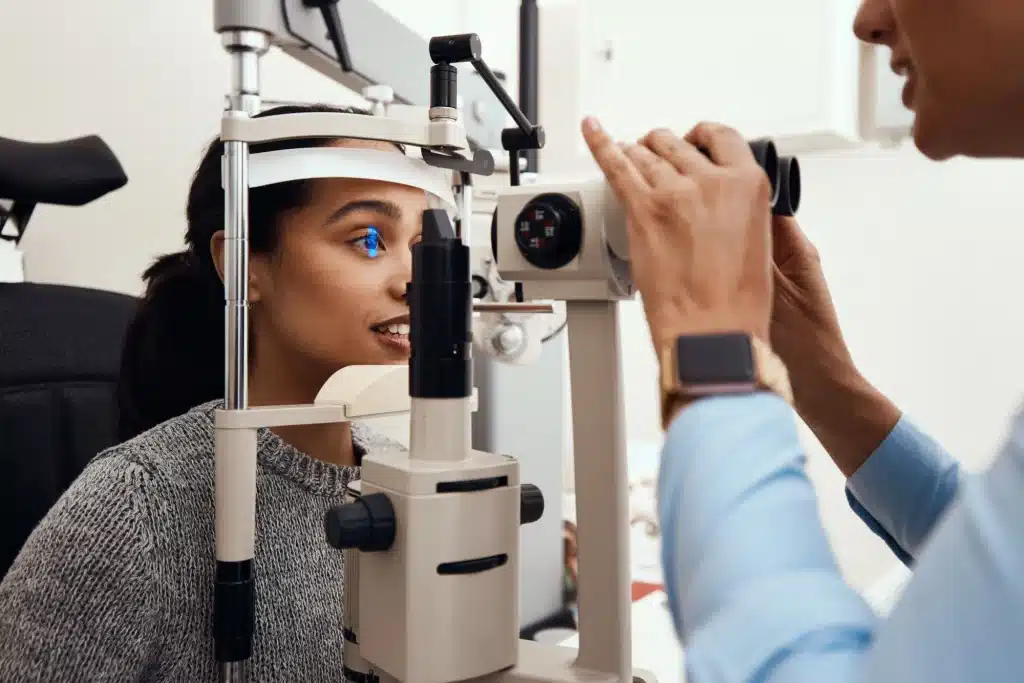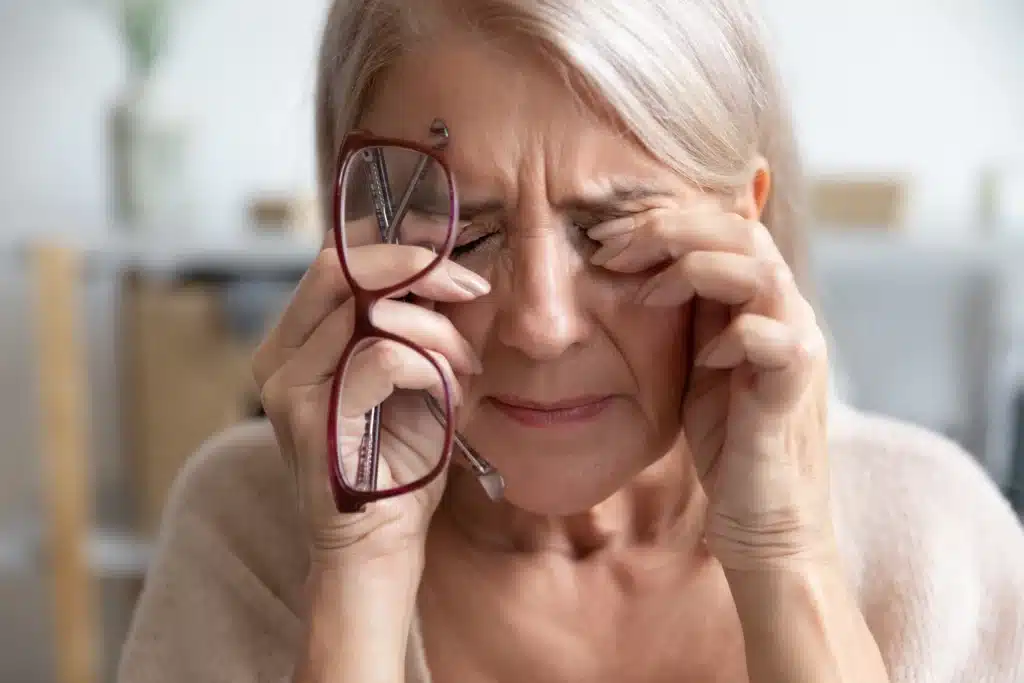Medically Reviewed by: Edward C. Wade, M.D., F.A.C.S.
Do I Need Reading Glasses?
If you’ve ever wondered, “do I need reading glasses?” chances are you may be having some problems with your vision –– and trust us, you are not alone. You likely need reading glasses if you find yourself holding things out in front of you in order to read them, getting headaches while reading, or needing more light to see your material.
So, how can you tell if you really need reading glasses? We may have the answers you’re looking for. The eye experts at Eye Center of Texas are here to explain the function of reading glasses and how to tell if you need them.
What are reading glasses used for?
As we age, our eyes age with us. Specifically, your eyes show their age by becoming less flexible. This loss of flexibility keeps your eyes from making the small adjustments needed to let in the right amount of light at the right angle when you’re looking at objects near you. This phenomenon is called presbyopia or “near vision.” It differs from hyperopia (or being farsighted) in that the presbyopia is age-related, while you are typically born with hyperopia.
Reading glasses help to compensate for the vision that is lost or allow you to see things close up. Reading glasses in particular are made in a convex or curved outward shape to help near objects to look clearer, so you will only need to wear them while reading.
Do glasses make your eyes worse? The idea that wearing reading glasses makes your vision weaker is false. Unless you are wearing the wrong type of readers such as a prescription that is too high, reading glasses should help with your vision problems, not contribute to them.
How do I know if I need reading glasses? Here are 4 ways to tell.
1. You are 40 years old or older
As we mentioned earlier, our eyes age with us. After they turn 40, it is very common for individuals with perfect vision to begin to see a decline in their vision. Even if you have always thought that you don’t need reading glasses, it is still a smart choice to see an eye doctor regularly (at least once every two years) after you turn 40 years old. Regular checkups will help you and your doctor stay on top of your eye health and monitor for issues such as cataracts, glaucoma, and macular degeneration.
2. You have to hold things out in front of you in order to read them
Think back to when you were a child –– do you remember seeing your grandparents squint and hold a newspaper or a book far away from their face when they tried to read something?
Presbyopia negatively affects your near vision. So while it sounds counterintuitive, it’s easier for people with presbyopia to read smaller print when it’s held further away from their faces. Needing to hold reading material farther out in front of you is a strong indication that you may need reading glasses.
3. You need more light to complete tasks
One question we ask patients who ask us, “how do I know if I need reading glasses?” is this: How often do you find yourself wanting more light in a room? As your eyes age, they may require more light for you to see well — another sign that your near vision might improve with the help of readers. Though this is not as obvious as the other possible reasons, it’s one that shouldn’t be overlooked.
4. You struggle with weary, tired, or strained eyes
The act of reading should never cause you pain. If you begin to notice how your eyes get tired or heavy after reading, you could need reading glasses. If you’re unable to get through a chapter of a book without feeling eye strain or nursing frequent headaches, your eyes are likely having to overcompensate to make up for the negative effects of presbyopia. Reading should be enjoyable, not painful. Having reading glasses can help reduce or eliminate eye pain as you read.
I might need reading glasses. What are my next steps?
If you relate to any of the four categories above, reading glasses may be a good investment for you. Your first step should be to schedule a comprehensive eye exam with an optometrist. Through this exam, the doctor will be able to designate the reading glass strength and provide you with an accurate prescription. The doctor will also advise you on when to wear reading glasses and other next steps.
Should I see an optometrist or an ophthalmologist? If you are searching for more long-term solutions on how to treat your near-sightedness, seeing an ophthalmologist could be beneficial. During that consultation, the ophthalmologist may be able to explore other options including LASIK in Houston for a more permanent solution to your vision problems.
Eye Center of Texas Provides Long-Term Solutions for Vision Loss
If you’ve ever asked the question, “Do I need reading glasses?” the answer might be yes. However, many patients see glasses and contacts as more of a hassle than an end-all solution. Though reading glasses can be a good temporary solution, they are just that: temporary. Procedures like cataract surgery and LASIK are long-term solutions for vision loss.
If the idea of corrective surgery is more appealing to you, Eye Center of Texas can provide you with the best cataract surgeon to achieve long-lasting results. To speak with an eye specialist today about your vision options, contact us online to schedule an appointment.
- What to Expect Before and After LASIK Eye Surgery
- When Is a Corneal Transplant Necessary
- Is Cornea Transplant Surgery Painful?
- Pterygium Surgery Cost Houston
- Do’s and Dont’s After PRK Surgery
Related Articles
Financing Options Available
Apply today to find a financing option that meets your needs.
Our Locations
Houston/Bellaire
6565 W. Loop S., Suite 650Bellaire, TX 77401
Medical Office:
713-797-1010
Medical Fax:
713-357-7276
LASIK/Near Vision:
Office: 713-395-1515
Fax: 713-357-7278
Pasadena
4415 Crenshaw RoadPasadena, TX 77504
Medical Office:
281-977-8800
Medical Fax:
281-977-8877
Sugar Land
15200 S.W. Freeway, Suite 130Sugar Land, TX 77478
Medical Office:
281-277-1010
Medical Fax:
281-277-4504
Clear Lake
455 E. Medical Center Blvd., Suite 110Webster, TX 77598
Medical Office:
281-332-1397
Medical Fax:
281-282-9152
Katy
Greenhouse Medical Plaza2051 Greenhouse Road, Suite 110
Houston, TX 77084
Medical Office:
346-547-7070
Medical Fax:
281-214-2971
The Woodlands/Conroe
100 Medical Center Blvd., Suite 118Conroe, TX 77304
Medical Office:
936-647-1610
Medical Fax:
936-647-1620


